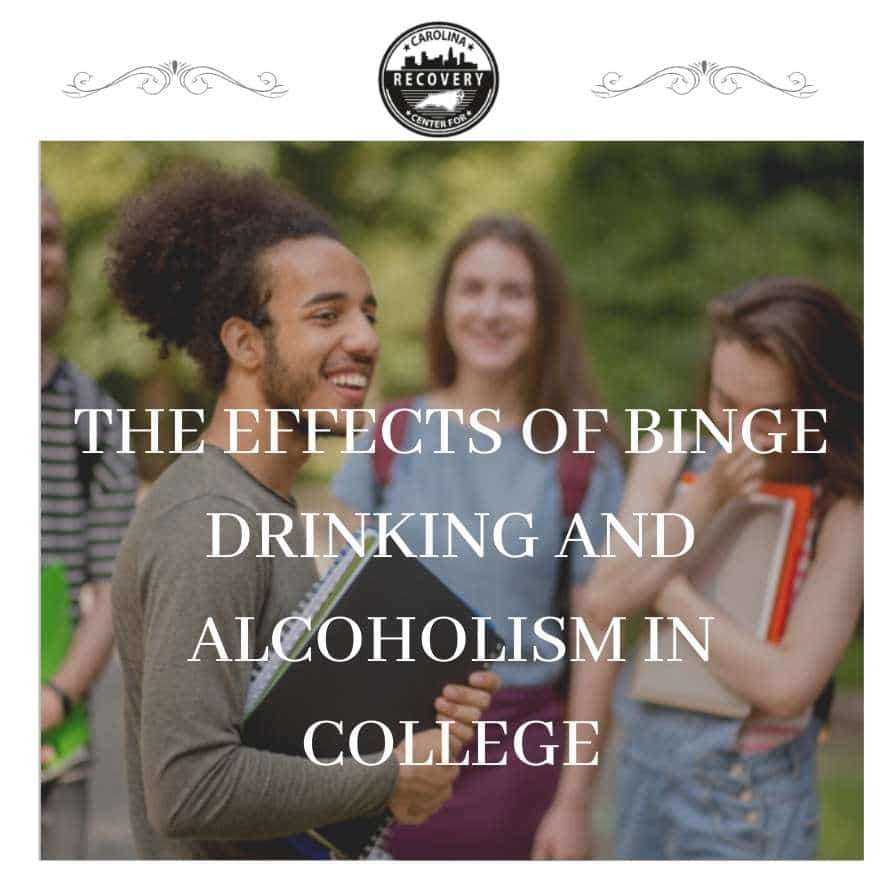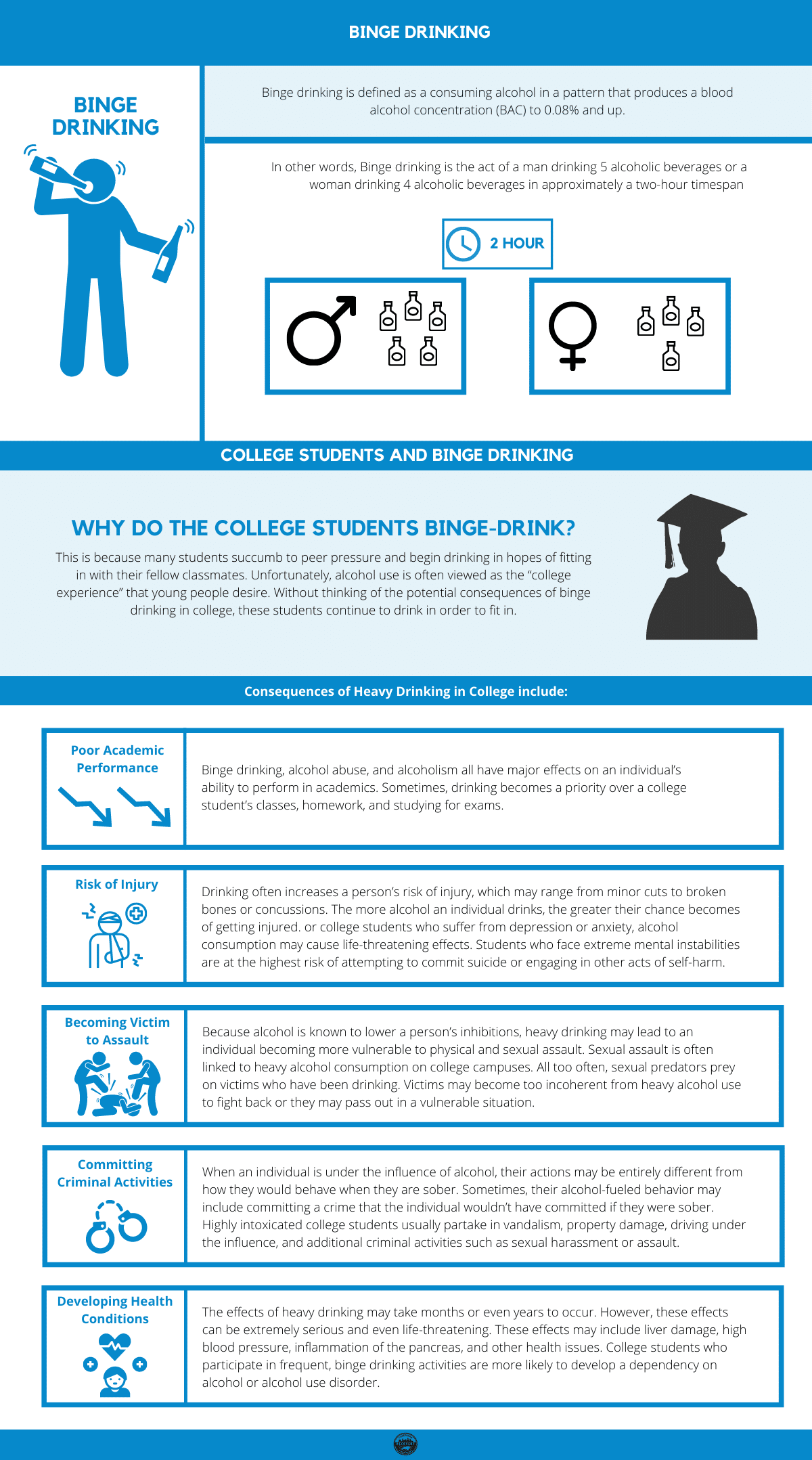The Effects of Binge Drinking and Alcoholism in College

Medically Verified: 2/1/24
Medical Reviewer
Chief Editor

All of the information on this page has been reviewed and verified by a certified addiction professional.
While it is relatively normal for college students to party, some students begin to suffer from the signs of alcoholism. In fact, college alcoholism affects millions of American students each year. Because of the popularity of alcohol experimentation in college, many students suffer from binge drinking, alcohol abuse, and alcoholism.
Alcohol consumption is so popular among college communities that 4 out of 5 college students consume alcohol to some degree. Additionally, almost 50% of those students engage in binge drinking, which is a problematic form of drinking that involves consuming too much alcohol at one time.
Individuals who partake in heavy and frequent alcohol consumption are at an increased risk of developing alcoholism, also known as alcohol use disorder (AUD). AUD often leads to significant physical and emotional damage. If you are currently a college student who partakes in binge drinking or suffers from alcoholism, it may be time to consider attending alcohol use disorder treatment. Here’s everything you need to know about college students and binge drinking.
College Students and Binge Drinking

A majority of college students consume alcohol in the manner of binge drinking. Binge drinking is characterized by an individual consuming an excessive amount of alcohol in a short time. For example, men who drink more than five alcoholic beverages in two hours are considered to be binge drinkers. For women, binge drinking is defined as consuming four or more drinks within two hours.
College students are most at-risk of binge drinking during the first six weeks of their freshman year. This is because many students succumb to peer pressure and begin drinking in hopes of fitting in with their fellow classmates. Unfortunately, alcohol use is often viewed as the “college experience” that young people desire. Without thinking of the potential consequences of binge drinking in college, these students continue to drink in order to fit in.
In recent times, college students have started favoring the consumption of hard liquor over beer. Instead of drinking to socialize, a large number of college students and young adults are drinking to get drunk. Because liquor has one of the highest alcohol percentages by volume, it takes fewer drinks to feel its effects, and therefore, is cheaper than drinking beer. The end goal for some college students is to drink as much as possible until they blackout. Unfortunately, this may lead to outcomes that are extremely dangerous and might lead to life-threatening effects, such as alcohol poisoning.
Consequences of Heavy Drinking in College
Almost every college student has been affected by heavy drinking during their academic career, even if they have never drunk alcohol themselves. For example, a student may witness their friend’s drinking patterns become more concerning over time, gradually taking precedence over everything else in their life. In other words, alcohol abuse in college affects more than just the individual, as it often destroys everything in its path- including friendships, relationships, and academic success.
Alcohol-related issues begin to appear when an individual is drinking excessively despite the consequences they experience.
Poor Academic Performance
Binge drinking, alcohol abuse, and alcoholism all have major effects on an individual’s ability to perform in academics. Sometimes, drinking becomes a priority over a college student’s classes, homework, and studying for exams. Research has found that an estimated one in four college students admits to having poor grades and additional academic issues as a result of their drinking.
Risk of Injury
Drinking often increases a person’s risk of injury, which may range from minor cuts to broken bones or concussions. The more alcohol an individual drinks, the greater their chance becomes of getting injured. Every year, nearly 600,000 college students unintentionally injure themselves as a result of heavy drinking. Injuries might involve bruising, fractures, muscle sprains, and other similar issues.
For college students who suffer from depression or anxiety, alcohol consumption may cause life-threatening effects. Students who face extreme mental instabilities are at the highest risk of attempting to commit suicide or engaging in other acts of self-harm. Alcohol significantly alters a person’s mind, which will, in turn, make them act irrationally.
Becoming Victim to Assault
Because alcohol is known to lower a person’s inhibitions, heavy drinking may lead to an individual becoming more vulnerable to physical and sexual assault. Unfortunately, nearly 700,000 college students between the ages of 18 and 24 have been assaulted by a student who engaged in binge drinking or alcohol consumption in some fashion prior to the offense.
Additionally, sexual assault is often linked to heavy alcohol consumption on college campuses. All too often, sexual predators prey on victims who have been drinking. Victims may become too incoherent from heavy alcohol use to fight back or they may pass out in a vulnerable situation. Sexual assault has lasting effects on an individual emotionally and physically. This may include getting a sexually transmitted disease (STD), having an unwanted pregnancy, or suffering from lasting psychological damage.
Committing Criminal Activities
When an individual is under the influence of alcohol, their actions may be entirely different from how they would behave when they are sober. Sometimes, their alcohol-fueled behavior may include committing a crime that the individual wouldn’t have committed if they were sober. Highly intoxicated college students usually partake in vandalism, property damage, driving under the influence, and additional criminal activities such as sexual harassment or assault.
Developing Health Conditions
The effects of heavy drinking may take months or even years to occur. However, these effects can be extremely serious and even life-threatening. Unfortunately, almost 150,000 college students develop some type of alcohol-related health problem each year. These effects may include liver damage, high blood pressure, inflammation of the pancreas, and other health issues.
College students who participate in frequent, binge drinking activities are more likely to develop a dependency on alcohol or alcohol use disorder. While alcoholism typically results from years of drinking, it also occurs during periods of heavy and frequent drinking. Bad drinking habits in college often evolve into other issues, such as alcoholism, in the future.
Treatment for College Alcoholism and Binge Drinking
If you or a loved one have experienced negative consequences from binge drinking as a college student, you may suffer from alcoholism. Fortunately, binge drinking and alcoholism are easy to overcome with the help of a comprehensive addiction treatment program. Get started by speaking with one of our dedicated treatment specialists today!

